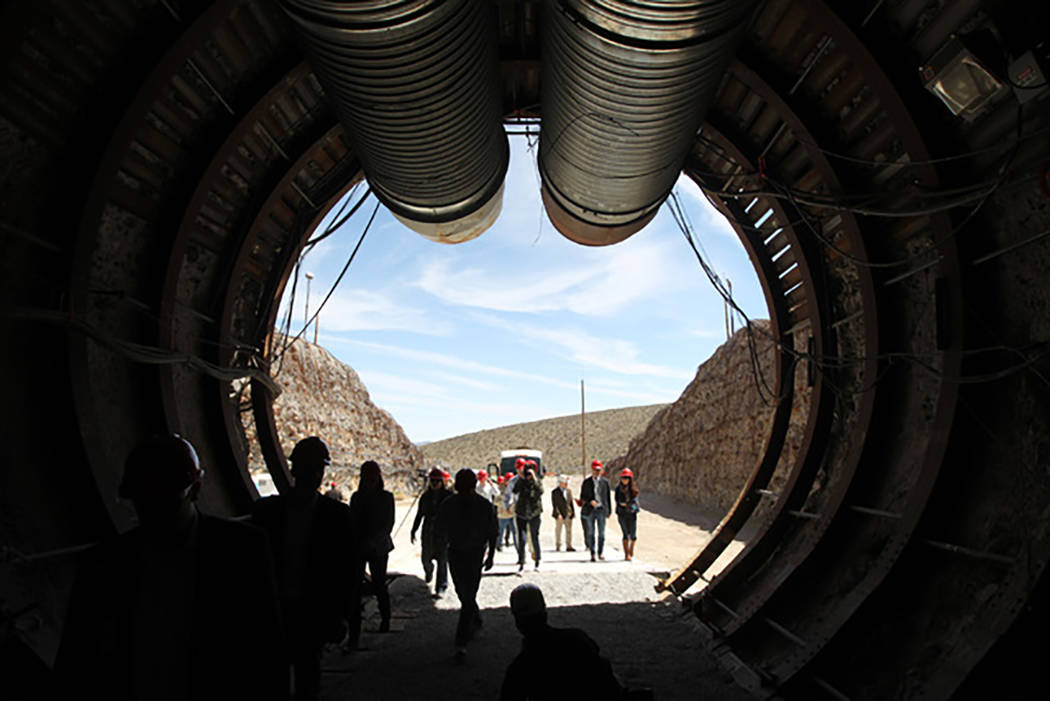
WASHINGTON — A move by the Nuclear Regulatory Commission to restart licensing on Yucca Mountain drew immediate criticism from lawmakers opposed to the disposal of high-level nuclear waste in Nevada’s Nye County.
The commission on Wednesday is scheduled to publish in the Federal Register a request for comment on the license. The White House Office of Management and Budget authorized the commission to collect information on the Nevada site.
The licensing process on Yucca Mountain began in 2008 but ended in 2010 when the U.S. Department of Energy, under the Obama administration, declared the site was no longer “a workable option.”
The administration backed a consensus-based siting process to select a permanent storage site.
The decision by the commission to restart the licensing process on Yucca Mountain was criticized by Sen. Ed Markey, D-Mass., a member of the Senate Environment and Public Works Committee.
“When it comes to nuclear waste storage, seismic matters,” Markey said.
Markey said in a statement that Yucca Mountain is in an active earthquake zone with two fault lines running through it, making it a high-risk site.
“Restarting the licensing process for Yucca Mountain would reach new heights of scientific irresponsibility,” Markey said.
Yucca Mountain was selected by Congress in 1987 as the site for permanent storage of nuclear waste from electrical generating plants.
“The Obama administration was right to stop the licensing process for Yucca Mountain, whose selection was based more on political science than on real science,” Markey said.
Input sought
The commission is seeking comment from the state of Nevada, local governments and Native American tribes or their representatives.
“I welcome a public comment period because it will give Nevada citizens and scientific experts the opportunity to once again express their opposition to this disastrous project,” said U.S. Rep. Dina Titus, D-Nev.
Titus said the public comment period “should not be seen, however, as a substitute for a consensus-based siting process.”
“Washington wants to hear from Nevadans, and I encourage all of my constituents to make their voices heard through the public comment opportunity and let those in Washington know what we already do: Yucca Mountain is dead,” said U.S. Sen. Dean Heller, R-Nev.
President Donald Trump, in his 2018 budget blueprint, included $120 million to restart the licensing process on Yucca Mountain and develop interim storage for 80,000 metric tons of nuclear waste from 33 electrical generating plants nationwide.
The federal government is responsible for disposal of nuclear waste and is being challenged in courts for failing to carry out its obligation.
A report made public last week by the nonpartisan Government Accountability Office, the investigative arm of Congress, found that restarting the process would take $330 million and up to five years to complete.
The GAO report also noted that after the Department of Energy withdrew its licensing application, it dismantled the Office of Civilian Radioactive Waste Management, which was established to oversee Yucca Mountain.
The GAO said it could take the department years to recruit and train the proper mix of scientists and engineers to manage the program. To restart licensing, the GAO said, the department would need to rebuild its staff to defend the application.
The House Energy and Commerce Committee is writing legislation to jump-start the development of Yucca Mountain.
Two key lawmakers on that committee said last week that while the GAO report cited challenges, the document could serve as a roadmap to completion of the licensing process and give Nevada stakeholders a chance to raise their concerns before the commission.
Nye County, where the Yucca Mountain site is located, favors completion of the process to determine whether Nevada is a viable place to store nuclear waste.
But Nevada, Las Vegas and a majority of the state’s congressional delegation oppose permanent storage of nuclear waste in the state.
U.S. Sen. Catherine Cortez Masto, D-Nev., said Yucca Mountain would put the health of Nevadans and the state’s economy at risk.
The DOE had spent $15 billion on developing Yucca Mountain until the licensing process stopped. The GAO said the cost to continue the licensing process would be roughly $330 million, based on commission estimates.
The state has filed more than 220 “contentions,” or challenges, to Yucca Mountain. There are more than 300 challenges, which would have to be litigated before the commission as part of the licensing process.
Costs outlined
Bob Halstead, the head of the Nevada Agency for Nuclear Projects, said the cost to complete the licensing would be closer to $2 billion.
Overall, Heller said, the cost to license, develop, operate and finally dismantle Yucca Mountain would cost an additional $82 billion beyond the $15 billion already spent on a site that faces stiff opposition.
In a Senate floor speech last month, Heller outlined the state’s issues with Yucca Mountain, “whether it be the crippling effect it will have on Nevada’s economy or the public safety issues associated with the transportation of this nuclear waste.”
The GAO report found that from 1983 to 2008, more than $15 billion was spent researching and preparing the license for Yucca Mountain.
It said another $330 million would be needed for the NRC to prepare for the licensing process, which could take up to five years.
Heller, in his speech on the Senate floor, said even if Yucca Mountain were to go forward it would be an extremely expensive project.
“DOE’s best estimate is another $82 billion would be needed to license, litigate, build, operate, decommission and eventually close Yucca Mountain,” Heller said.
Contact Gary Martin at 202-662-7390 or gmartin@reviewjournal.com. Follow @garymartindc on Twitter.